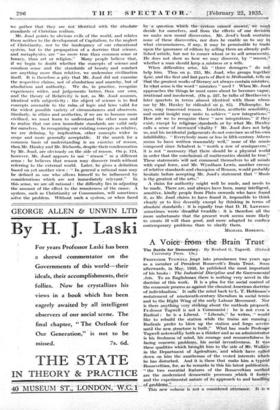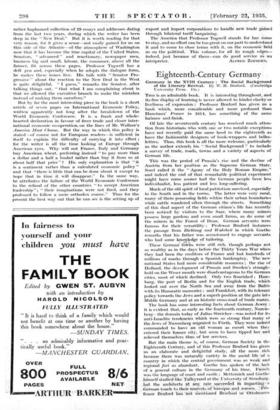A Voict4tiont the -Brain Trust The Battle lor Democracy. By
Rexford G. Tugwell. (Oxford Upiversity Press. Isis.) PROFESSOR TuowELL leapt into prominence two years ago as a member of President Roosevelt's Brain Trust. Soon afterwards, in May, 1933, he published the most important of his books : The Industrial Piscipline and the Governmental Arts. To an Englishman there is nothing very novel in the doctrine of this work. It is a plea for the social control Of the economic process as against the classical American doctrine of individualism: It calls the mind back to-L. T. Hohhouse:s restatement of nineteenth-century liberalism in social terms and to the Right Wing of the early Labour Movement. Nor is there anything very' stilldng, about the methods proposed. Professor Tugwell is not a Coinmunist :' he is not even -a Radical : he is a Liberal. "-Liberals," he writes, -" would like to rebuild thestation while the trains are running.; Radicals prefer to blow up the station and forgo service until the new, structure is built." What has made Professpr Tugwell notewoittiy both as a thinker and as an administrator is his freshness "of mind, his courage and resourcefulness in facing concrete, problems, his social inventiveness. It was these qualities which brought him to the-side of Mr. Wallkee' in the Department of Agriculture,--and which" have called down on him the anathemas of the vested interests he has disturbed. And it is, these that make him a typical -114xweveltian, for, as he remarks in'this his latest publication, "the two essential features of the Rooseveltian method are the modernized democratic processes .which it fosters and the experimental nature of its approach to and handling of-probleM - - • This new volume is not a considered utterance. It is 11 rather haphazard collection of 29 essays and addresses dating from the last two years, during which the writer has been deep in the "New Deal." But it is worth reading for that very reason, for it gives a sense—not easily gained for us on this side of the Atlantic—of the atmosphere of Washington now that it has become the true capital of the United States. Senators, " advanced " and reactionary, newspaper men, business big and small, labour, the consumer, above all the farmer, flit across these pages. Professor Tugwell has a deft pen and, especially when he adopts the dialogue form, he makes these issues live. His talk with "Senator Pro- gressive" about the reaction to the New Deal in the West is quite delightful. "I guess," remarks the Senator, after talking things out, "that what I am complaining about is that we allowed the executive branch to make the mistakes instead of making them ourselves."
But by far the most interesting piece in the book is a short article of seven pages on International Economic Policy, written apparently not long after the breakdown of the World Economic Conference. It is a frank and whole- hearted declaration in favour of freer trade and closer inter- national economic co-operation, on the lines of Mr. Wallace's America Must Choose. But the way in which this policy is stated—of course not for European readers—is sufficient in itself to explain the difficulty of carrying it into effect ; • for the writer is all the time looking at Europe through American eyes. Why will not France, Italy and Germany buy American wheat, preferring instead "to pay more than a dollar and a half a bushel rather than buy it from us at about half that price" ? His only explanation is that "it is a sentiment rather than a calculated economic policy" and that "there is little that can be done about it except to
• hope that in time it will disappear." In the same way, he attributes the failure of the World Economic Conference to the refusal of the other countries to accept American leadership"; "their imaginations were not fired, and they professed to follow a mere orthodox course." Thus for the present the best way out that he can see is the setting up of export and import corporations to handle new trade gained through bilateral tariff bargaining.
The America that Professor Tugwell stands for has come to stay, and no effort can be too great on our part to understand it and to come to close terms with it, on the economic -field as on the political. This volume, for all its rough edges— indeed, just because of them—can do good service as an



















































 Previous page
Previous page